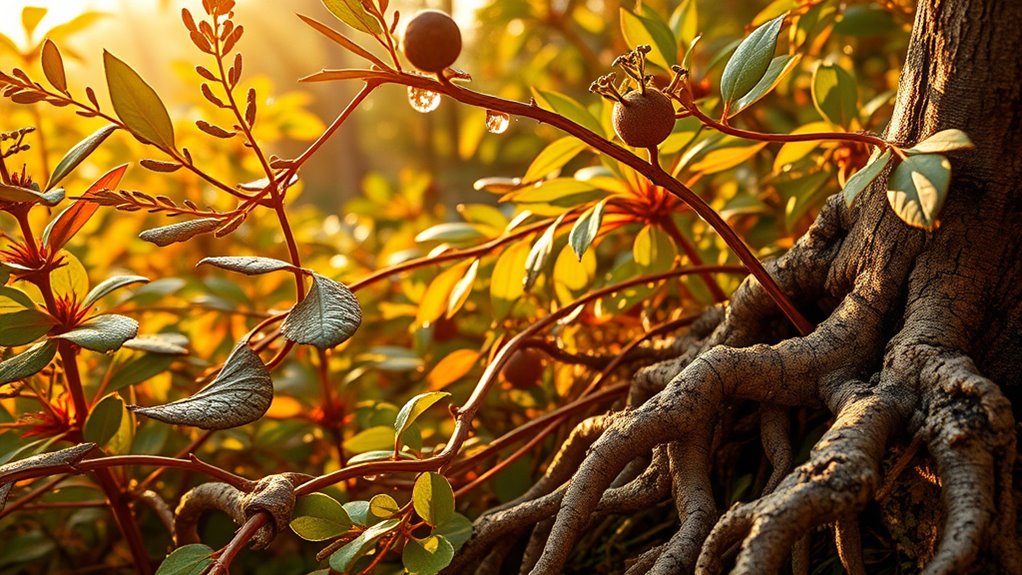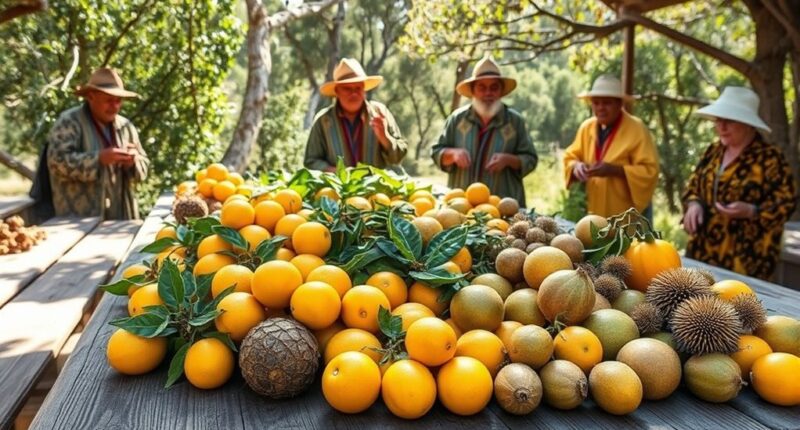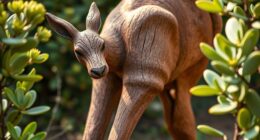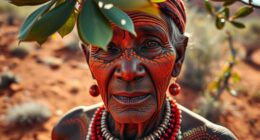You can learn from bush tucker healing by embracing its holistic approach, which emphasizes harmony between your body, environment, and cultural traditions. Indigenous practices focus on natural remedies, personalized care, and sustainable use of native plants—less invasive options that complement modern medicine. Incorporating these principles encourages a deeper connection to land and health, fostering wellness that goes beyond symptoms. If you want to discover how these ancient insights can enhance contemporary care, keep exploring further.
Key Takeaways
- Embrace holistic health approaches that integrate physical, mental, and environmental well-being.
- Recognize the medicinal potential of native plants through traditional knowledge and sustainable harvesting.
- Incorporate culturally sensitive practices to personalize treatment and promote patient-centered care.
- Value land-connected healing methods that emphasize balance, harmony, and environmental sustainability.
- Foster collaboration with Indigenous communities to enrich modern medicine with ancestral wisdom.

While modern medicine has made incredible advances, many Indigenous communities continue to harness bush tucker—native plants and foods—to support healing and wellness. These communities rely on traditional remedies rooted in centuries of cultural practices, which have proven effective in maintaining health and treating ailments. Unlike synthetic pharmaceuticals, bush tucker offers a holistic approach, emphasizing balance between body, mind, and environment. You might find that Indigenous healing methods incorporate specific plants known for their medicinal properties, used in teas, poultices, or as food. These practices are often passed down through generations, embedded in stories, rituals, and ceremonies that reinforce their significance. Additionally, respecting these traditional practices can foster greater cultural understanding and collaboration in healthcare settings. What modern medicine can learn from these traditional remedies is the value of understanding natural ecosystems and the interconnectedness of health. Indigenous knowledge encompasses more than just the plants themselves; it includes the context in which they are harvested and prepared, respecting the land and its cycles. This cultural practice fosters sustainability and a deep respect for nature’s resources. You might notice that these remedies are often tailored to individual needs, emphasizing personalized care rooted in centuries of experiential knowledge. For example, certain native plants are used to boost immunity, soothe inflammation, or improve digestion, with each remedy backed by observation and tradition rather than purely scientific validation.
Indigenous bush tucker offers holistic healing rooted in centuries of tradition and cultural practices.
Furthermore, integrating these cultural practices into modern healthcare could enhance wellness approaches by offering more holistic, less invasive options. Instead of relying solely on pharmaceuticals, health practitioners could incorporate bush tucker-based remedies that have stood the test of time. This integration would not only honor Indigenous wisdom but also promote a broader understanding of health as a connection to the land. You could also see a shift toward more sustainable and eco-friendly health practices by respecting Indigenous protocols and harvesting methods.
Ultimately, modern medicine can learn to value the depth of Indigenous knowledge about medicinal plants, recognizing that healing isn’t just about treating symptoms but about restoring harmony within the individual and their environment. Embracing these traditional remedies, rooted in cultural practices, might lead to more holistic health solutions that respect both scientific innovation and ancestral wisdom. By doing so, healthcare can become more inclusive, effective, and sustainable—honoring the age-old relationship between people and the land that has sustained them for generations.
Frequently Asked Questions
How Can Bush Tucker Healing Be Integrated Into Western Medical Practices?
You can integrate bush tucker healing into Western medicine by valuing traditional knowledge and respecting cultural practices. Collaborate with Indigenous healers to understand the healing properties of native plants and incorporate them into treatment options. This cultural integration fosters trust and broadens therapeutic approaches, allowing you to offer holistic care. Embracing these practices enriches modern medicine, ensuring it respects and utilizes diverse healing traditions.
Are There Scientific Studies Supporting Bush Tucker’s Healing Properties?
You might wonder if scientific validation supports bush tucker’s healing properties. While traditional remedies have been used by Indigenous Australians for generations, modern studies are limited but growing. Some research suggests certain bush foods possess anti-inflammatory or antimicrobial effects. However, more rigorous scientific investigations are needed to fully understand and validate these healing claims. This ongoing research could help integrate traditional bush tucker remedies into mainstream healthcare.
What Challenges Exist in Adopting Bush Tucker Methods Globally?
You face challenges when adopting bush tucker methods globally, mainly due to cultural barriers and regulatory hurdles. Different societies may resist traditional practices or lack understanding of their benefits, making acceptance difficult. Additionally, strict regulations around food safety and medicinal claims can slow down integration into mainstream healthcare. Overcoming these obstacles requires respectful cultural engagement and clear scientific evidence to satisfy regulatory standards.
Can Bush Tucker Healing Treat Chronic Illnesses Effectively?
Imagine a treasure chest of traditional remedies waiting to be opened. Bush tucker healing shows promise in treating some chronic illnesses, but cultural barriers often hinder acceptance worldwide. While these remedies offer natural benefits, more research is needed to confirm their effectiveness. You might find that integrating bush tucker practices with modern medicine could create a holistic approach, overcoming cultural obstacles and revealing new pathways to health.
How Do Cultural Perceptions Influence Acceptance of Bush Tucker Medicine?
You might find that cultural perceptions heavily influence how bush tucker medicine is accepted. Cultural barriers and traditional beliefs can either foster trust or create skepticism around these healing practices. When communities understand and respect the cultural significance behind bush tucker, acceptance grows. Conversely, dismissing traditional beliefs can hinder integration. To improve acceptance, you should promote cultural awareness and dialogue, acknowledging these roots while sharing the potential health benefits.
Conclusion
By embracing bush tucker healing, you could open nature’s pharmacy, offering fresh perspectives on health. Did you know that over 80% of modern medicines derive from natural sources? Incorporating traditional knowledge could lead to groundbreaking treatments and a deeper understanding of healing. So, next time you consider a new remedy, remember that the wisdom of indigenous practices might just hold the key to future medical breakthroughs. It’s time to learn from nature’s ancient pharmacy.
Mary is a passionate writer who brings creativity and a fresh perspective to our team. Her words have the power to captivate and inspire, making her an essential contributor to our content. Mary’s commitment to storytelling and dedication to promoting Indigenous culture ensures that her work touches the hearts of our readers. We’re fortunate to have her as part of our team.










